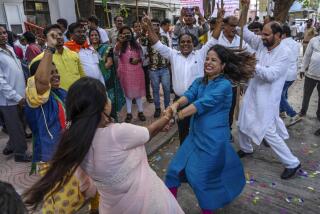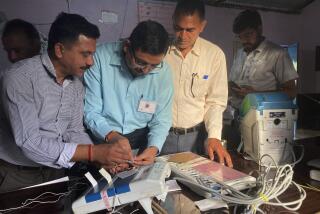Punjab Voters Defy Sikh Extremists’ Boycott Call; Turnout Heavy
- Share via
CHANDIGARH, India — Defying calls by Sikh extremists for a boycott, voters in the Indian state of Punjab turned out in large numbers Wednesday for an election considered a critical test of Prime Minister Rajiv Gandhi’s plan to resolve a bloody conflict between Sikhs and Hindus.
At stake are Punjab’s 13 seats in the Indian Parliament and all 117 seats in the state assembly. No returns are expected until today, but the large turnout, estimated at 60% or more by state election officials, was seen as a triumph for Gandhi, even if his Congress-I party loses to the Akali Dal, the main party of Punjab’s 9 million Sikhs.
The prime minister set the stage for confrontation between his government and the Sikh extremists by pressing ahead with Wednesday’s election despite the assassination in August of the moderate Sikh leader, Harchand Singh Longowal.
The extremists promptly called for a boycott, and Wednesday’s large turnout was therefore considered as much an endorsement of Gandhi and the agreement he signed with Longowal in July as a test of strength between his party and the Akali Dal.
Plan Hinged on Turnout
Officials feared that a low turnout, or widespread violence at the polling places, would upset Gandhi’s plan to end the conflict that has turned Sikhs against Hindus in Punjab and other parts of northern India.
But only one death was reported Wednesday, and the police said that no Sikh extremists were involved. Several bombs were found at polling places, but all were defused without incident.
More than 150,000 soldiers and policemen were on duty to discourage violence.
“There was much less violence than we expected,” Surrinder Kapur, an election supervisor, told a reporter. “There are usually more fights than this. People have really demonstrated their faith in the ballot.”
First Vote in 5 Years
Throughout Punjab, from Amritsar, the Sikh holy city up near the Pakistan border, to Chandigarh, the state capital about 150 miles to the southeast, Sikh and Hindu voters alike turned out for their first election in nearly five years.
At one polling place, in the tiny village of Malpoor Arkan, men and women waited in line for more than two hours.
At another, near Chandigarh, more than 70% of the voters turned out to decide a state assembly contest in which one of the candidates was the widow of a man who took part in the assassination last October of Indira Gandhi, the late prime minister and mother of the incumbent. Bimal Kaur Khalsa, the widow of Beant Singh, was running as an independent--to “serve the Sikh nation, which my husband also served by sacrificing his life,” she said.
Beant Singh, a bodyguard for Indira Gandhi, was shot to death by other aides immediately after the assassination.
Militant Sikhs, despite their call for a boycott, flocked to the widow’s support in the belief that if she could win, it would embarrass the Gandhi government. One of them, Sham Singh, said, “This is our message to the government, that our leaders are not serving the people.”
Fear of Violence
At some places, poll workers said that at least some voters were staying home because they feared the possibility of violence, but few voters would admit to being afraid.
Raghunandan Lal Bhatia, a Congress-I leader in Amritsar, went to vote accompanied by eight armed escorts, one carrying a submachine gun. Six months ago, Bhatia, a wealthy Hindu businessman who is one of the party’s six general secretaries, was wounded in a terrorist attack.
More to Read
Sign up for Essential California
The most important California stories and recommendations in your inbox every morning.
You may occasionally receive promotional content from the Los Angeles Times.













